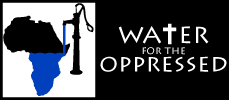About Us
Leadership | Our Beliefs | The Calling
Mission Statement
Making Disciples and demonstrating God's love to the oppressed, by bringing physical life through clean water and spiritual life by proclaiming the "living water" of the Gospel of Jesus Christ.
The Water Project Process
Water for the Oppressed provides clean water to the people of Zambia, Africa through the construction of new water wells and the repair of broken hand pumps. The process of providing clean water to a particular village is orchestrated through the Zambian government's local water council and village chief or representative. The village chief or representative contacts the water council in their district to inform them of the need for a new water well or hand pump repair. The local water council will in turn contact Water for the Oppressed, either by formal letter or an office visit, to present the particulars of the village which is requesting our services. At this point, Water for the Oppressed will conduct a field inspection of that particular village to assess the current water situation.
When we are notified of a need for a new water well project or a pump repair, we consider concerns such as the distance the people are walking to locate clean water, the number of people within the area of need, points of contamination near the village, recurring illnesses in the village and the number of broken hand pumps in the surrounding area. After our assessment has been completed, we reconvene with the local officials and determine if we can be of assistance to the village.
The construction of a new water well in a village instantly brings happiness and relief to the people of that community. The new well provides a clean water source and the people can now abandon the use of water from the contaminated rivers and streams. In almost every case, the new water well is in or very near to a village. Since the women and children normally fetch water, they are grateful for the close proximity since this will dramatically decrease their walking when it comes to locating water. Without a doubt, the new clean water source improves the health of the community by reducing water borne diseases such as cholera, typhoid, meningitis, and diarrhea.
The most economical way to provide clean water in Zambia is through the repair of existing pumps which are broken. The repair of a broken hand pump provides two services. First, the repair enables a water well (water source) to become active once again as a source of clean water. Second, the repair overcomes the barrier of traveling extreme distances to gather water. The time saved by not having to walk a great distance to fetch water can now be spent with family or other necessities. As we repair hand pumps in the field, we see neglect of routine hand pump maintenance, theft of certain mechanical parts, and wear from excessive use as leading causes of hand pump failure.
Water for the Oppressed provides a health and hygiene component as a part of their field work. The training focuses on enhancing the community members' knowledge of health and hygiene issues. Upon completion of a drilled well or a hand pump repair our hygiene team teaches very important hygiene lessons such as, clean hands clean hearts, germs, disease transmission, and proper hand washing techniques. In addition, we demonstrate the construction of a tippy tap: a home-made water-saving device (made from a plastic jug-suspended from a tree etc.) complete with attached soap. It’s ideal for hand washing when water is scarce. The purpose of teaching these lifesaving lessons is to promote and be aware of the importance of maintaining a clean area surrounding the hand pump as well as proper hygiene practices. In the developing world, countless lives are saved everyday through good hygiene practices. Utilizing these important lessons rapidly decrease illness in rural villages.


